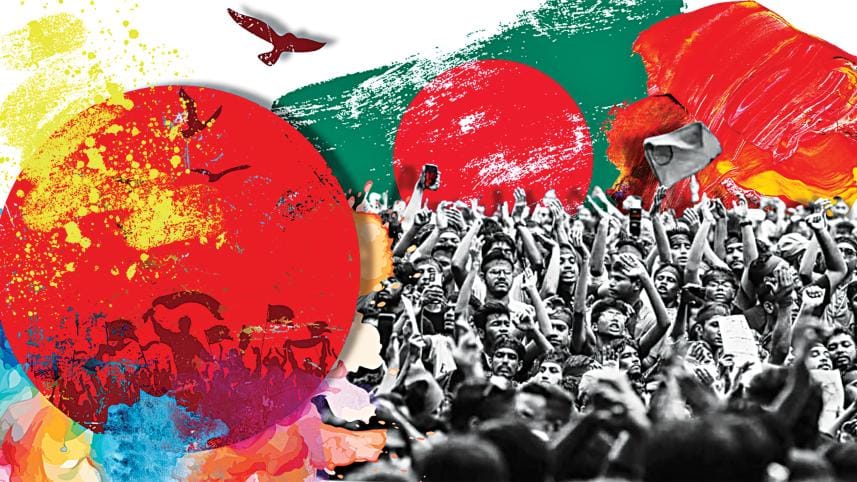Not waiting for answers

How long does a corpse of a hero take to rot? 50 years or more? What about the corpses of martyrs? One week? 10 days? The 40-day mark to blow the candles of funeral fires? What if these corpses were mummified and inserted into living bodies by some strange mechanism, then does the soul of a bygone hero survive intermingling with the soul of the living? Do we even have souls? Do they also know how to cry? Do the dead leave the world at all? Mixing with the soil beneath and the air above water–do they become dark-skinned fruits, hard-pitted seeds, scentless flowers?
Do the unhealed, vengeful living misconstrue the words of the corpses they carry? Can corpses talk? Can the past's language still be relevant today? Do pasts speak only on repeat, in muted sighs and high volumes on screens to remind us how dead they are? Do these pasts ever beg to be let go? Do these pasts want to swallow whole the living which use them to survive?
What's the meaning of survivor's guilt and how many of us have it? How many times can an event be played on loop for it to lose its power? What are the dilemmas of the ones who hang in the middle? Besides shelter and food? Is it that we always have too much to lose yet not enough to go by? Is it our supposed clear conscience matched with bent spines? Is it fear of deaths and tears shed over recent corpses which have turned our clocks counterwise?
Are we stuck or are we moving forward? Is death yesterday's news or is it tomorrow's? Can we lend courage from posterity to untie our hands, so we can hold the truth that keeps sliding by?
What's the maximum length of time we are allowed to stay in purgatories? Do limbos run out of space or give up replicating patterns of demise? Does history really repeat itself? Or are we struck by some magician's dark spell, reenacting history–painted on walls, bleeding till we fall, to become corpses in a soulless world–bulldozed, stampeded, wiped clean for a future that resembles old sorrows?
Are our bodies an extension of the land we are born into? Do footsteps over our native terrains vibrate in our insides? Do the silences of its hidden silos create pockets of voids in our lungs and minds?
Do we all carry remains of war-fields in our ribcages? Do we then lie down with the weight of ancient weapons, face-up to the sun, and beg for mercy, for Grace to enter, to pardon us for crimes we committed and didn't, for words we spoke and that which remained unspoken, for our breaths which always feel borrowed? Should we cut open our chests, exposing our hearts and its muffled screams? Are there any tears left to shed by the clouds who stare at us cold and distant, can they break open blood-stained skies?
And then when the sky breaks, do we howl from the base of our spines, all of which we had held inside–disguised, disowned? Do we learn how to swim in mud to become lotus buds or do we get stuck between yesterday's wrath and today's shifting power? Who do we trust? Can we even trust our own impulses, emotions? Can we grow new ears to differentiate truths from half-truths and half-lies? Or do we spend a few days in stillness to stop the earthquake and its aftershocks or have our nerves turned to steel? Is anyone working on calming our insides, banking on the overused but unignorable word––heal?
Did someone tell us that victory can also be vicious? Do we draw boundaries in our celebrations or let our joy run wild while mobs ravage our earth in the name of justice and pent-up scorn? Will we always have scores to settle, is forgiveness just a myth we were told about, are its edges too soft to carry, its voice too bold?
Do all deaths–of children, young ones, mothers, fathers, animals, objects, nations, trees, beliefs, hope, identity and foresight–reincarnate to bring us peace? How long do we have to wait for clarity? How long till the unheard speaks?
Will the world revolve faster tomorrow? Spin us out of our morbid guises and fling us to someplace fresh and high? Do we dare ask the Universe to whimper, do we dare go off orbit searching for a guiltless star's warmth and light?
Iffat Nawaz is a Bangladeshi-American writer based in Pondicherry, India. Her first novel, Shurjo's Clan, was published by Penguin India (Vintage) in 2022, and was shortlisted for the Best First Book Award by Tata Lit Live/Mumbai Literature Festival in 2023.



 For all latest news, follow The Daily Star's Google News channel.
For all latest news, follow The Daily Star's Google News channel.
Comments